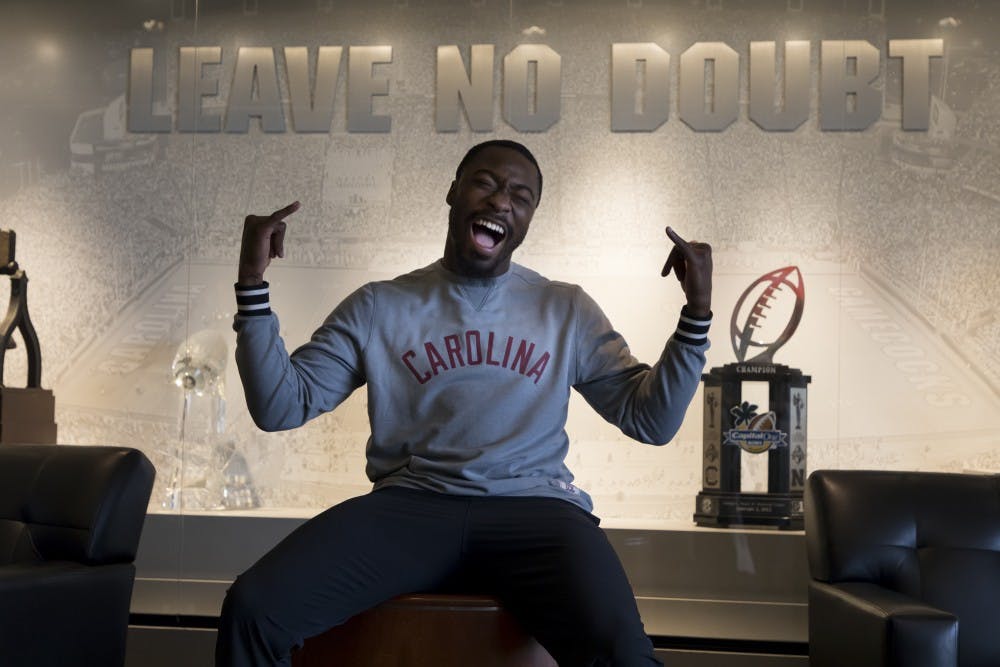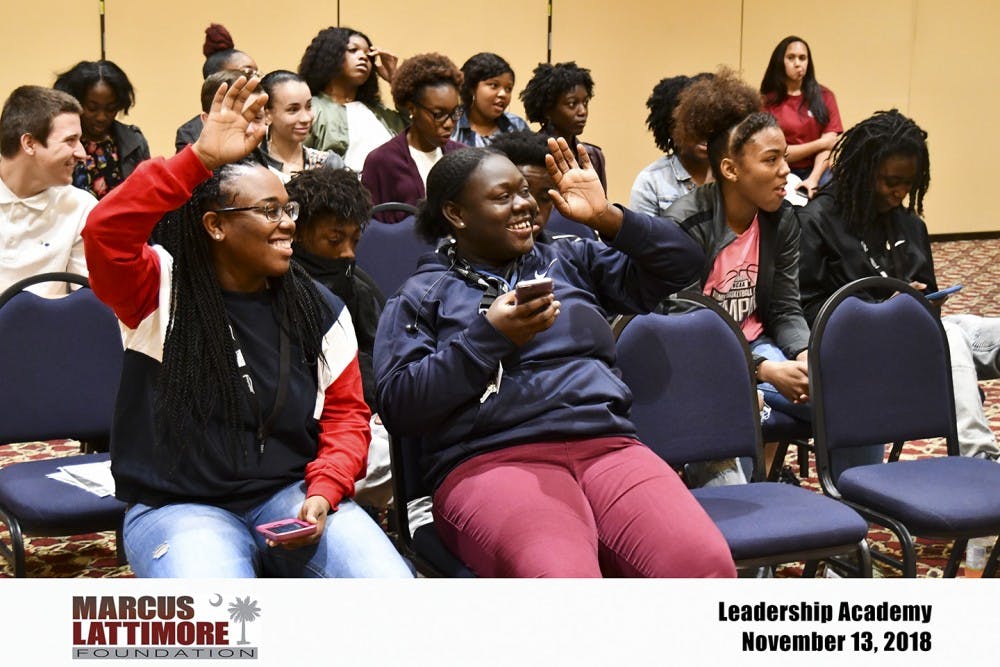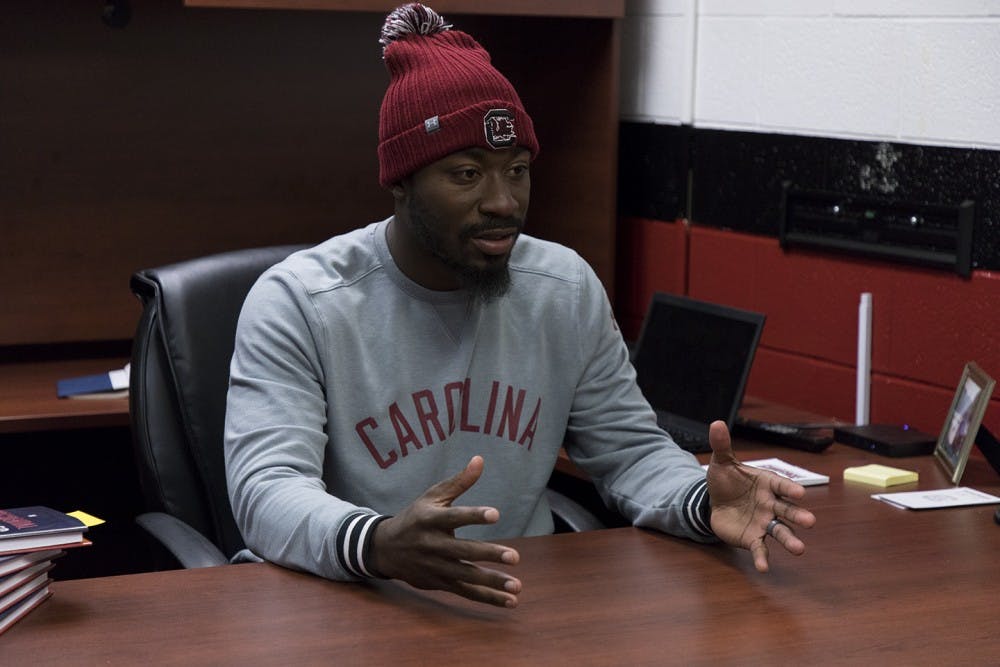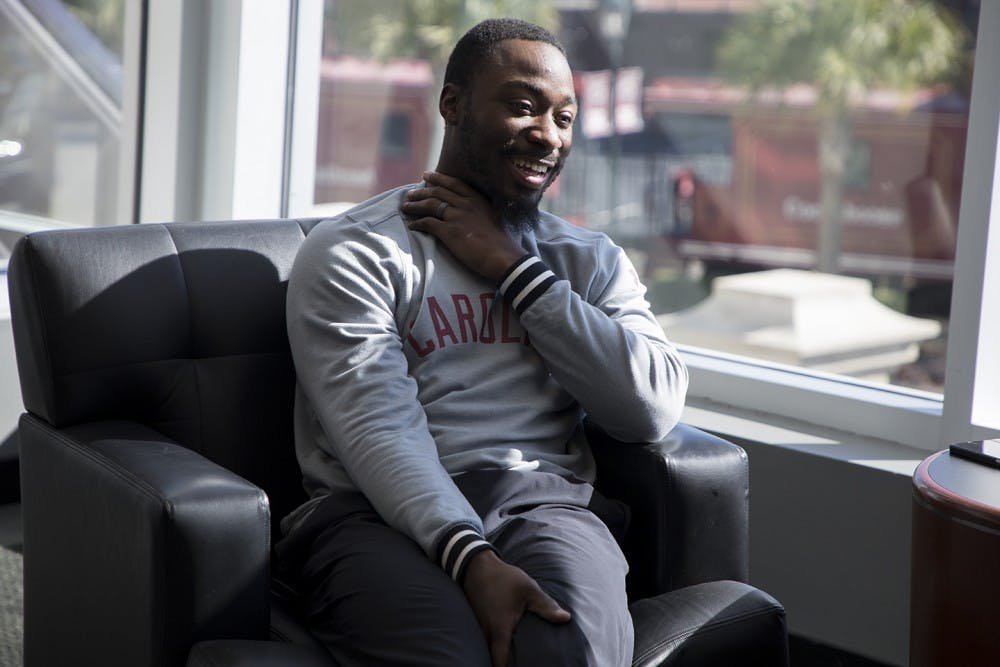As South Carolina players piled on the bus to meet their next opponent, the Gamecocks often would plug headphones in their ears and get into a "zone." But former running back Marcus Lattimore looked out the window and saw a bigger picture.
“I really wanted to take in the whole experience,” Lattimore said. “For some odd reason, I don’t know why, I was so just aware of what was going on, I wanted to be aware of what was going on and it sparked my interest in college football in general and all of the celebrity and hoopla around it ... I was looking at the fans. I was looking at everything the game day experience had to offer.”
The bigger picture was one that Lattimore sought out during the recruiting process at South Carolina. He had a lot of choices—Auburn, Georgia, Penn State and South Carolina, to name a few—but he needed to find the perfect fit.

Each of those schools had a running back tradition except for South Carolina. Lattimore knew that he needed to go to a school that was going to run the ball.
“When I came on a visit here, it was totally different, there was no tradition,” Lattimore said. “There was no history, but it was close to home and I wasn’t a fan of Clemson or South Carolina growing up, but it was close to home and it made a lot of sense for me to stay here, but I just needed to be convinced that this was the right place.”
Lattimore had already established a community with Bruce Ellington, Dylan Thompson and A.J. Cann, and he knew those friendships would outlast his career. This was the number one reason why Lattimore chose South Carolina.
He saw a chance to make history as a Gamecock with the help of South Carolina’s defensive line coach, Brad Long.
“He said, you can go to Georgia, you can go to Penn State, you can go to Auburn, but you’ll just be another guy,” Lattimore said. “You’ll be another running back that they’ve had who's had a great career there and a great career in the NFL, or you can come here and you can be the guy.”
Lattimore wanted to do something that the South Carolina football program had never seen. With the help of teammates Alshon Jeffery and Stephon Gilmore, Lattimore’s vision became clear on how he would start the tradition as a Gamecock, even though it scared him.
The South Carolina native had the opportunity to start as a freshman, and he knew that people were looking for him to start the tradition.
In the moments leading up to kickoff, Lattimore took everything in. The Gamecock Walk was one experience when he saw that the game was more than just football.
“I enjoyed seeing the fans there and being able to make someone smile because I showed up,” Lattimore said. “I never took that part of the game for granted. When I got to the field two hours before the game, I would just walk the field and just really remind myself that I'm here and to be grateful for it.”
Even on the field Lattimore played with that same type of mentality, as he ran for 2,677 yards and 38 touchdowns in three seasons. This energy came from Lattimore not just thinking about football, but seeing the opportunity as a “big picture opportunity for me to impact a lot of people unconsciously.”
He didn’t want to be the guy that he remembered watching in high school who threw their opportunity away even though they had the talent.
During Lattimore’s sophomore year, he faced something that comes with the game: an injury.
He tore his MCL and ACL, which planted him on the bench for a while. But Lattimore persevered, recovered and soon found himself running the ball again at Williams-Brice Stadium.
Lattimore knew he could bounce back.
Entering into his junior year, he talked with head coach Steve Spurrier and running back coach Everette Sands in their office. They said if he stayed healthy and had a pretty good year, he'd be a first round draft pick.
This gave Lattimore hope. He saw his chance to achieve his goal of going into the NFL.
As his journey progressed into his junior year season, he did not remain healthy. The running back tore every ligament and hamstring, experiencing slight nerve damage against Tennessee in 2012.
“I go into that season, I go into the ninth game of the year,” Lattimore said. “I'm named captain as a junior and the night before the game I got hurt, I told every single guy in the locker room to go out there and play like it's your last because it may be your last.”
During Lattimore's time at the hospital, reality started to set in. As a player, he did everything his coaches asked of him and performed to his best ability each game, so he couldn't help but question why this happened to him.
He started to realize that football might not be a possibility for him anymore and that was all that he had ever known.
All he knew was that he was tired of getting hurt.
“I just couldn’t understand why it happened to me,” Lattimore said. “When you put the work in and at that time, my faith wasn’t as strong as it is so I was beating myself up, I was blaming people. I was making excuses. I was feeling sorry for myself and then my coach's wife handed me a journal and on the journal it has Jeremiah 29:11 on it.”
But Lattimore soon saw the outpour of support from so many people around the nation. He received thousands of letters, which he has placed on the walls of his garage.
“I just thought about the impact, the impact that moment in time had on a lot of people because it was so visible. So many people watching the game and it was the nature of the injury, which is something you just don’t see it everyday," Lattimore said.
With the influence that Lattimore had, he knew he had to give it one more shot.
He decided to give the NFL a chance, for his sanity, knowing that he did everything that he could. Lattimore wanted to show his community that he could overcome another challenge.
To prepare for the NFL, Lattimore rehabbed and did a workout at Williams-Brice the night before the draft.
The former Gamecock was drafted by the San Francisco 49ers in 2013 in the fourth round with the 131st overall pick. This was another high moment for Lattimore.
A year went by, and he realized he would never reach his full potential as an athlete again after suffering his first injury.
Lattimore continued to fight through the problems with his knee, but he knew in the back of his mind that he had to retire from the 49ers. He made the decision on Nov. 4, 2014, and retired the next day.
“I know I was okay because I gave everything that I could," Lattimore said. "I feel like my life has been like that, it has been up and it has been down, it’s been up, it’s been down, but I guess it’s just how you handle those lows and how you handle those highs. That is what makes you who you are.”
This journey for Lattimore was not easy as he had to give up one of his passions, but he said that the challenge was essential.
And he soon found a new challenge. The challenge of what he was going to pursue next.
Lattimore thought back to 2012 when he was in a hospital bed. He remembers sitting next to his mom and step-dad, feeling desperate.
“You know, up until that point, I had been prepared for every challenge,” Lattimore said. “This challenge, I was not prepared for. Not knowing what was next after football and I could not imagine what students who don’t have the background that I have, the necessary foundation that I had when it comes to my parents and my mentors in my life. I could not imagine how you transition after a sport if you don't have that guidance.”
That awareness prompted Lattimore to think about what high school students need to survive on a day to day basis once their athletic careers end.
“There are so many kids who don’t hear that,” Lattimore said. “They don’t hear that your sport will end because for some reason, we think we're immortal and we will think we'll play forever because it is such a high feeling and you want that feeling forever, but the reality of it is that it will end.”
This is why Lattimore’s foundation exists—because he didn't hear it enough that his sport would one day end. His number one goal is to plant that seed and then make sure that these students have the skills beyond just dribbling a ball.
It became clear: the foundation was Lattimore’s next step.
The Marcus Lattimore Foundation is committing to funding, creating and supporting programs and initiatives that work to develop the next generation of leaders in South Carolina.
Since the start of the foundation, Lattimore has had four Annual Leadership Academies for student athletes who have the potential to play at the next level. Each of those students were nominated by athletic directors, coaches, career specialist and school counselors. Last month in North Charleston, for example, Lattimore hosted speakers who touched on NCAA preparation and career readiness.

“Whatever is a prudent issue at the time, that’s what we try to do in the Grand Strand, the Lowcounty, the Midlands, the Lowcountry and the Upstate,” Lattimore said.
Lattimore has done other community outreach missions, like one that provided about thousand families in Ridgeland (one of the Palmetto state's poorest communities) with Thanksgiving meals. He also partners with a Walmart every Christmas to take kids shopping.
Each of those ideas that Lattimore saw helped to lead him to a head coaching position at Heathwood High School in 2016 and further shaped the framework to bringing him back to the University of South Carolina.
“Up until to this point, has been a decision of fear," Lattimore said. "A decision of something that was going to challenge me, which is why I took the job at Heathwood, which is why I started a foundation, which is why I’m here now, it’s a new challenge.”
Lattimore found himself back where he started. He's now the Director of Player Development for South Carolina.
“I wouldn’t want to be anywhere else, honestly, because I know this is where I can make the biggest difference,” Lattimore said. “This is where I made my name. This is where my story was created. This is where I became a man, at this school, and it wasn’t about options for me. It was more about being able to share what I've learned and the lessons I've learned with guys that have set in the same chair.”
The experiences that Lattimore has had, high and low, are vital when he gives advice to current Gamecocks. He has been where they are.
Lattimore has had to overcome his introverted nature to reach these players and help them understand that their values and beliefs will take them further than the game ever will. With this, Lattimore’s passion has come to life.
“We see obstacles as a setback, or because we leave in a digital word with social media, our egos are inflated,” Lattimore said. “We always have instant gratification at our disposal at any time, and just life in general has changed because of social media and getting them to realize that is not real life, the things that will last are respect, are integrity, are honor, are discipline; are these things that you learn here are going to carry you further way beyond your talent.”
From girlfriend problems to struggles in the classroom, Lattimore has been these football players' rock and mentor during their collegiate career.
With the foundation and his position at South Carolina, Lattimore has come from being a recruit to a player to a professional and still is reaching players through football.
“It kind of has revealed to me that what I love, my purpose, what I want to do with the rest of my life,” Lattimore said. “My foundation, it started as an idea and it's come to fruition and because of that, and to be able to share life skills and social skills with students in high school as well as college, bridging that gap, I mean I really couldn't think of a better position for myself.”
Even with the success that Lattimore has seen through his time with the foundation and the university, he knows that there is still work to be done. Especially with the world always evolving, he says, he strives to relate to players and understand what they're going through.
Lattimore plans to eventually branch the foundation out, starting with North Carolina and Georgia. He also hopes to grow and learn so he can be better for the student athletes because that is his ultimate goal.

Since he first looked out the bus window before stepping onto the field, Lattimore has never taken for granted the influence and impact that he has over student athletes, fans and the nation.
“I think I represented the university with integrity and honor 'cause I never gave up, and I've been able to inspire a lot of people with my story," Lattimore said.
But being inspirational is not the important thing, he said. It's more important to remember that athletes like him still have human emotions, feelings and goals.
"And because so many people got a glimpse into my life," Lattimore said, "they can see that we're all the same."

